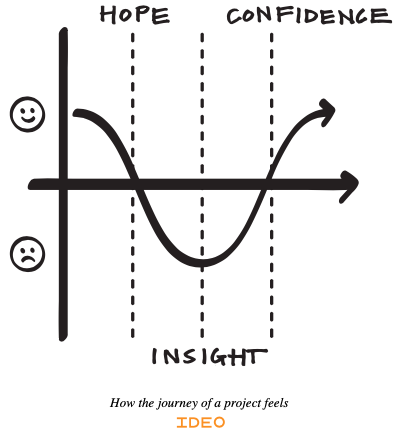Getting to ‘eureka’
“We think that if we just plan well enough, our projects will go smoothly from start to finish,” I was telling the workshop attendees as I traced a straight line in the air.
“But on the heart monitor at a hospital, what does a straight line mean?”
“You’re dead!” people called back.
While this particular workshop a few weeks back was about project planning, it also applies to how we approach our careers. On the screen I had one of my favorite graphics, from design thinking firm Ideo, on how the journey of a project feels.

Nobody wants to plunge into the middle valley of despair after high hopes at the outset. However, research shows this actually is better for us in the long-term. This model is what a successful journey looks like, because at the end you’ve climbed back up and gained confidence.
In the field of education James Nottingham calls this the learning pit, a compelling model for how students achieve better educational outcomes.
There’s even a school that repurposed an empty hot tub so their students could literally sit in the pit!
At first, the “cognitive wobble” Nottingham describes seems frustrating, even counterproductive. Why spend all this time debating what a tourist is when you could just look it up and move on?
But all that struggle can lead the students to their eureka moment. And that’s where true growth happens.
“They necessarily have to struggle first to then have a chance of getting that sense of elation,” Nottingham says.
Crucially, whether or not we learn during these struggles depends on how we view our mistakes. Researchers found that after an initial “oh crap” response, people who “believed they can learn from their mistakes did better after making a mistake — in other words, they successfully bounced back after an error.”
What does all this mean for our professional journeys? I recently saw a post from a connection on LinkedIn who wanted to start over as a beginner with a new job. How many of us can say the same in our advancement-obsessed professional culture?
There’s a difference between this generative, collaborative mental struggle and the grind of showing up to a toxic workplace. One is struggle for survival and will quickly burn you out. But challenging ourselves to learn can lead to new opportunities, if we’re only open to career journeys that twist and turn along the way.
When you map your career river, you may find that the biggest curves along your journey follow those beginner moments, when you had to grapple with a new skill or learn the ropes in a different industry. After I left my first company, I “fell” several ladder rungs from managing 10 direct reports to a non-manager role. But at that second job I learned the marketing and business skills — through quite a bit of cognitive wobbling — that directly led to my next job consulting with more than 100 newsrooms on their audience engagement strategies.
As Nottingham points out, “eureka” comes from Greek for “I have found it.” When we let the career ladder dictate what jobs we should take to show steady advancement, we lose out on the challenges that will ultimately allow us to grow.
I love how Nottingham describes the difference this makes. We all deserve to feel this way in our work lives:
How many times have parents picked up children and said, “What did you do at school today?” and our children say, “Nothing.” Try shutting them up if they’ve had that eureka moment … and when they come back to school the next day, what will they want? More of the same.
Happy navigating,
Bridget
Member discussion